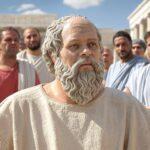
A Logocentric call to arms. The ancient Greeks identified three modes of persuasion: ethos, the appeal to the character or credibility of the speaker; pathos, the appeal to the emotions of the audience; and logos, the appeal to reason and the argument itself. In a sane and ordered civilization, these three exist in a hierarchy with logos at the summit. Reason, which is the reflection of the divine order, must govern emotion and […] Read more »












